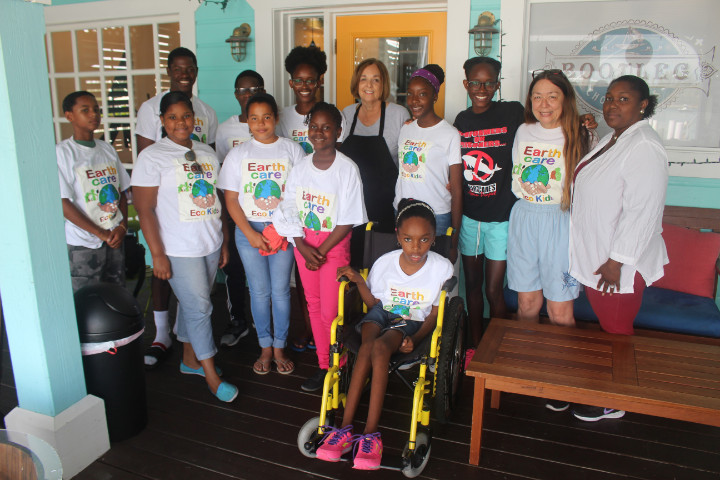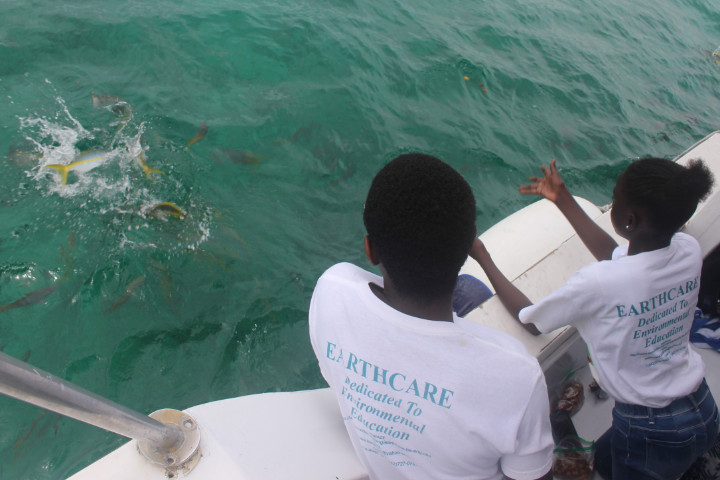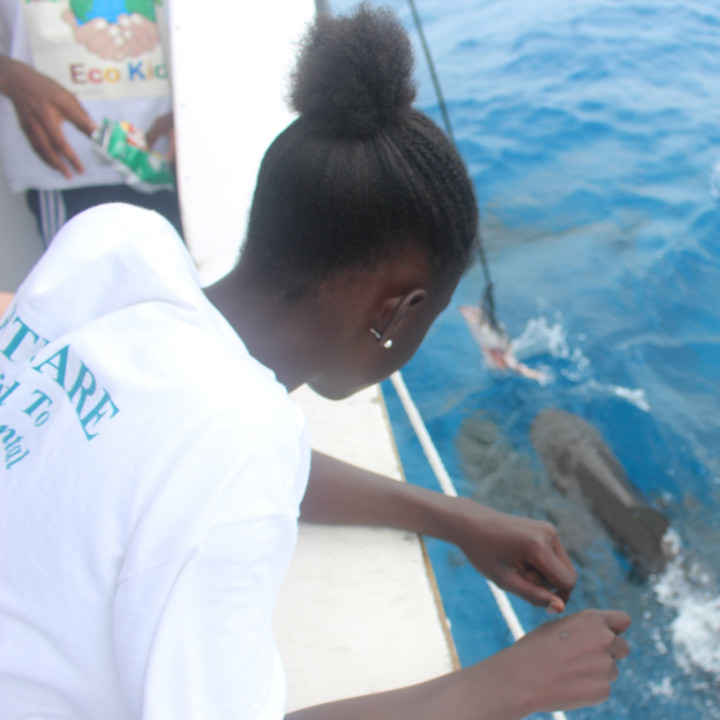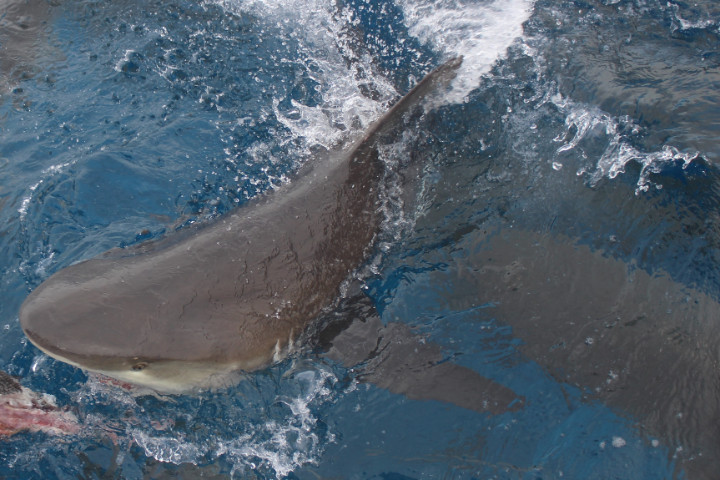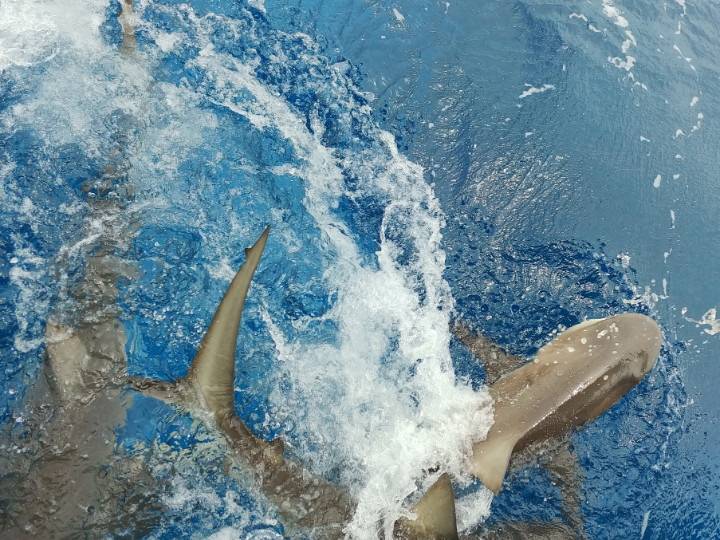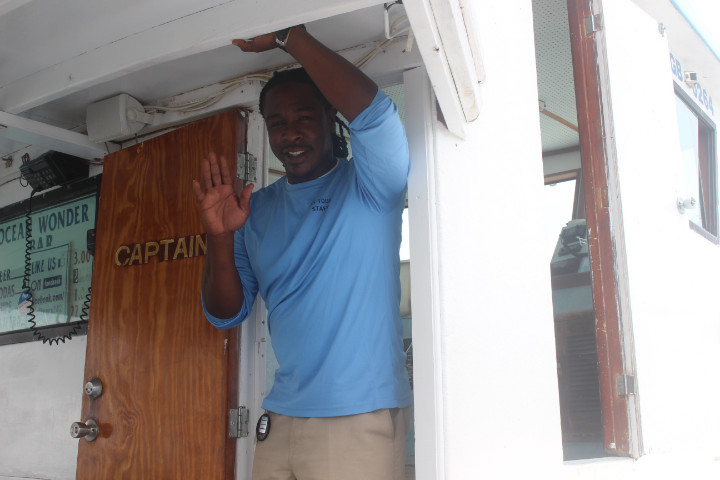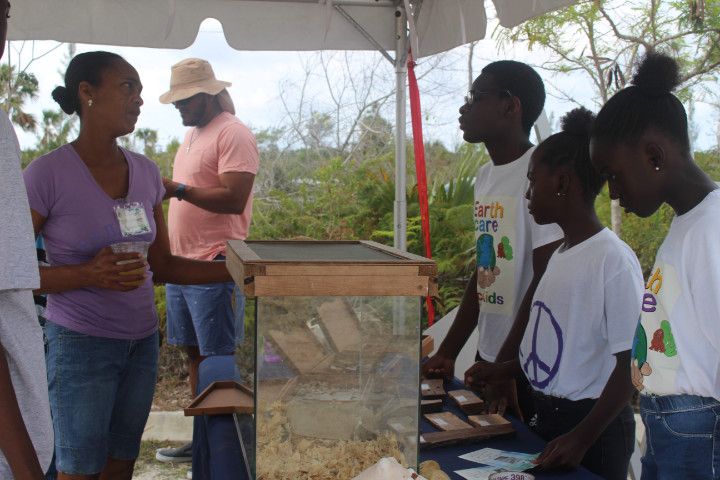|
From:TheBahamasWeekly.com Community
In April the EARTHCARE Eco Kids learned about Sustainable Fisheries. We were hosted by Daphne Ormerod, Owner of Bootleg Chocolates and Christina Meme who kindly let us use their shop for our presentation and gave the students complimentary hot chocolates and Chocolate turtles. Ms. Ormerod remarked, “Chocolate Turtles are the only way that the children should eat turtles”. Before the main Filed trip a number of the EARTHCARE Eco Kids attended the Lucayan National Park’s National Park Day put on by the Bahamas National Trust. The field trip for the Sustainable Fisheries topic was a trip on the Reef Tours Glassbottom Boat. Our Captain Henrick Maycock and his First Mate, Karon Blatch gave the students a wonderful experience: feeding the yellowtails and watching the Caribbean Reef Sharks have a meal.
According to Gail Woon, Founder of EARTHCARE, “Sustainable Fisheries Management has been a challenge in the Bahamas. The country is one of the last stands for the Nassau Grouper which is all but extinct in most areas of the Caribbean. The Bahamas National Trust and many other NGOs were instrumental in protecting the turtles and sharks. Worldwide, overfishing done by industrial, extremely efficient and destructive fishing methods such as longline fishing and driftnets has decimated fish stocks in almost every ocean. In addition, coral reefs worldwide are dying as a result of pollution and climate change. Other threats to reefs are Habitat Destruction due to megaresort developments like the Pier Terminal in Bimini by Resorts World Bimini. Healthy reefs were buried and choked in sediment kicked up by dredging to build a Pier terminal for a cruise ship that only operated for a year and then stopped.
In 2011, The Bahamas became the second country in the region to take action to protect its shark populations. The Bahamian sanctuary was created by adding an amendment to the Fisheries Resources (Jurisdiction and Conservation) Act (Chapter 244) to prohibit commercial shark fishing along with the sale, importation and export of shark products. Sharks worldwide are under extreme threat due to overfishing and finning for shark fin soup. 100 to 200 million endangered sharks are killed either directly by humans or indirectly each year. As of 1st September 2009, all marine turtles in the Bahamas are protected. Unauthorised capture, sale, possession, harassment, etc. is illegal. Green Turtles are herbivores eating seaweed and sea grass. The Caribbean once supported hundreds of millions of green turtles but many large colonies were eliminated centuries ago by commercial harvest. Loggerhead turtles can dive 230 meters or more and stay down for 30 minutes on one breath of air. All of the marine turtle species are endangered worldwide. Our government decided to protect the Nassau Grouper by making a closed season when they are spawning. If you are going to close the season, the gear used to catch the species should be taken out of the water. Lobster traps have to be out of the water when season closes. Wire traps are not required to be taken out of the water.
In the lobster business right from the beginning the catch season is too long, August 1- March 31. It used to open in September and end in February. The laws changed so that the Bahamas could keep up with other countries. The season is designed to protect lobster when they spawn. The older, bigger lobster, that are not portion size, 20 oz. tail, 60 oz total almost a 4 lb lobster, the 5 lb lobster should be protected. That would ensure that broodstock lobster would increase from as soon as they make that law. They don’t stop laying eggs over their lifetime. Harvesting of Conch meat at sea, breaking shells at sea, harvesting the meat only is a sure way to make it possible for fishermen to cheat the system. There is no way to tell if it’s a roller (juvenile) or not. Bring the conch in the conch shell to harvest. The majority of poundage of conch brought to market is harvested at sea and shells are not brought back. Scientists have recently proven that conch reproduce much later than we thought. Previously it was thought conch start to lay eggs when their lip flared. It turns out that they don’t start reproducing until the flared lip is at least 15 mm thick. So instead of 3-5 years old they might be 7-10 years old before they start to reproduce with ripe gonads. Fisheries regulations regarding the queen conch should be amended to take into account the flared lip thickness in relation to gonad ripeness in order to give more of our conch a chance to reproduce before they are harvested. In other words, it would be best to have the harvestable size be with a flared lip shell thickness of at least 15 mm instead of just a flared lip of any thickness. Further, we should be instituting a closed season for the harvesting of conch since the Bahamas is one of the last countries where they are found in any kind of numbers. Conch are effectively extinct in much of the Caribbean region.
The single most important thing for a conservation effort is that people follow the rule of law because the waters have to be policed. National Parks will be ineffective if there is no policing. We are given the responsibility of protecting a zone and not allow the species to be depleted by overfishing. Every nation on earth has that responsibility. The Bahamas is one of the last strongholds for species where they are fished out in the Southern Caribbean and South Florida. Poachers come to fish our waters because we have a difficult time monitoring our seas. If we are going to lead then we have to hold the Government and the Department of Fisheries accountable, if they are going to make a law, then they need to find a way and means, the wherewithal to police the waters effectively. The Defence Force, while being manned by dedicated individuals, has a difficult time doing its job because it is not furnished with the right tools. Finally, we must fish our waters sustainably so that the species that we harvest have time to reproduce successfully so that future fishers will have sufficient numbers of species to harvest and those fishermen and women in turn, must fish sustainably to ensure that their heirs have fish to fish as well.” EARTHCARE Eco Kids would like to thank Reef Tours, Bootleg Chocolates, the parents/guardians and Awesome Without Borders for invaluable assistance. EARTHCARE copyright 2018.
|
